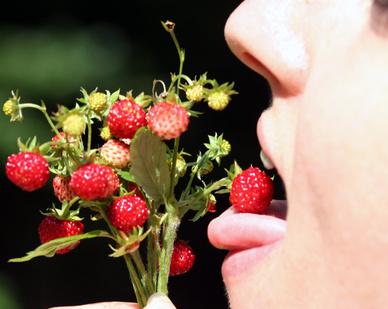When it comes to healthy, glowing skin, what you put into your mouth is as important as what you put on your face. Skin reflects your general health, and nutrition plays a large part in determining how healthy you are. Diet affects your skin as well as your overall health, according to dermatologists at the Baylor College of Medicine. Healthy diet and nutritional practices can give your skin a healthy boost.
General Diet
A healthy diet that is low in fat and low in sugar is best for your skin, says Dr. John Wolf, chair of dermatology at Baylor College of Medicine. Your body needs a variety of vitamins, minerals, fats and proteins to produce new skin cells. The best way to get those nutrients is through a varied diet that includes fresh fruits and vegetables, high-quality proteins and essential fatty acids.
Wrinkle Prevention
Sun and environmental factors contribute to wrinkles, but the right food may mitigate some damages. Researchers at Monash University in Melbourne, Australia, conducted a study to learn if a correlation exists between diet and sun-damaged skin, particularly wrinkles. They found that people whose diets were high in whole milk, red meat, processed meat, potatoes, soft drinks and cakes or pastries showed significantly more wrinkles than those whose diets were higher in fruits, whole grains, green leafy vegetables and monounsaturated fats, like olive oil. In short, the Mediterranean diet may be as good for your skin as it is for your overall health.
Vitamins for Healthy Skin
Choose fresh fruits and vegetables for younger-looking skin, according to a Healthy Tips newsletter from the University of California at Berkeley. Many fresh fruits are high in antioxidants, such as vitamin A, vitamin C and vitamin E, which help prevent sun damage. More specifically, an article at Northwestern Health Sciences University notes that vitamin A contributes to keeping skin moist–dry, bumpy skin is a symptom of vitamin A deficiency; your body needs vitamin C to form collagen, a main component of skin; and vitamin E improves skin texture and helps other vitamins do their jobs better. In addition to the vitamins found in fruits and vegetables, your skin needs the B-complex vitamins found in whole grains and seeds to help keep skin hydrated and looking healthy.
Foods to Avoid
One pizza or chocolate bar won’t make your skin break out, but a steady diet of fatty, sugary food will probably have a negative effect on your skin, according to Wolf. Foods high in starch, fat and sugar can cause your insulin and sugar levels to bounce up and down; those fluctuations can spark changes in your skin that result in acne.
Diet may also help you if you have eczema, according to the University of Maryland Medical Center. Eczema outbreaks may be caused or worsened by food allergies, so work with a doctor to determine specific foods that may trigger an allergic reaction. In addition, saturated fats, sugar and refined foods may make eczema worse by contributing to inflammation. Whole grains, fresh veggies and foods that provide essential fatty acids can help reduce the symptoms of eczema.
Vegetarian Considerations
Vegetarians, especially vegans, should make a special effort to include foods high in riboflavin in their diets. The best sources of riboflavin, which is a necessity for healthy skin, are animal products, including liver, red meat and milk. If you avoid those foods, then be sure to get plenty of leafy green vegetables and enriched whole grains, or talk to your doctor about a daily supplement containing riboflavin.
Photo Credit
- eating strawberry image by Elena kouptsova-vasic from Fotolia.com





